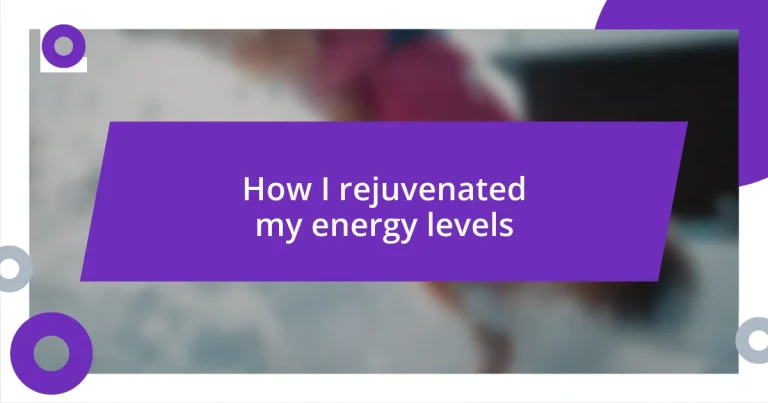Key takeaways:
- Energy levels are influenced by diet, sleep quality, hydration, stress, and exercise; understanding these connections is crucial for rejuvenation.
- Implementing a balanced diet and regular exercise can significantly enhance energy levels and overall well-being.
- Tracking progress and adjusting strategies based on personal observations helps maintain motivation and adapt to changing needs effectively.
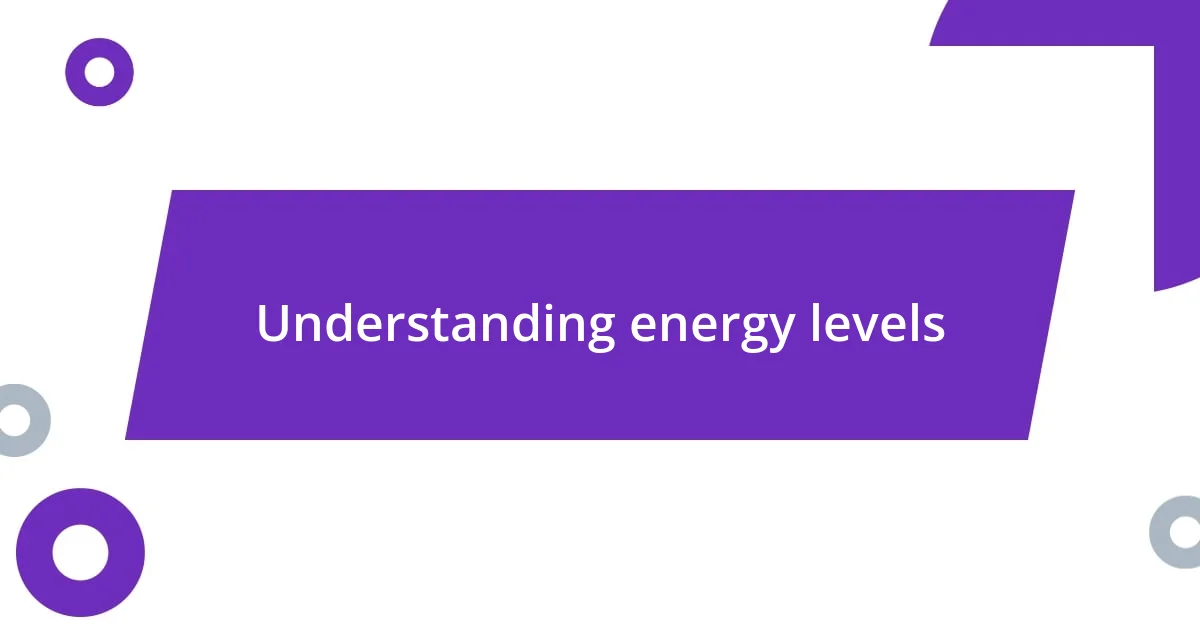
Understanding energy levels
Energy levels are often an intricate blend of physical vitality and mental clarity. I remember a time when I’d wake up feeling drained, despite getting what was supposed to be enough sleep. Have you ever felt that way? It’s frustrating to realize that energy isn’t just about how much rest we get but also about how we fuel our bodies and minds throughout the day.
Thinking back, I often overlooked the impact of what I consumed on my energy. For instance, after a week of indulging in sugary snacks and caffeine, my energy would crash, leaving me grumpy and lethargic. It’s amazing how our choices, even seemingly small ones, can create a rollercoaster effect on our overall well-being. Could it be that simply swapping out a sugary treat for a piece of fruit might change your entire afternoon?
Moreover, emotional factors play a huge role in how energetic we feel. I found that periods of stress or anxiety would sap my energy faster than a long night out. Have you ever noticed that when you’re worried or overwhelmed, even simple tasks feel monumental? Understanding the connection between our emotional state and energy levels has been a game changer, allowing me to seek balance and rejuvenation more effectively.
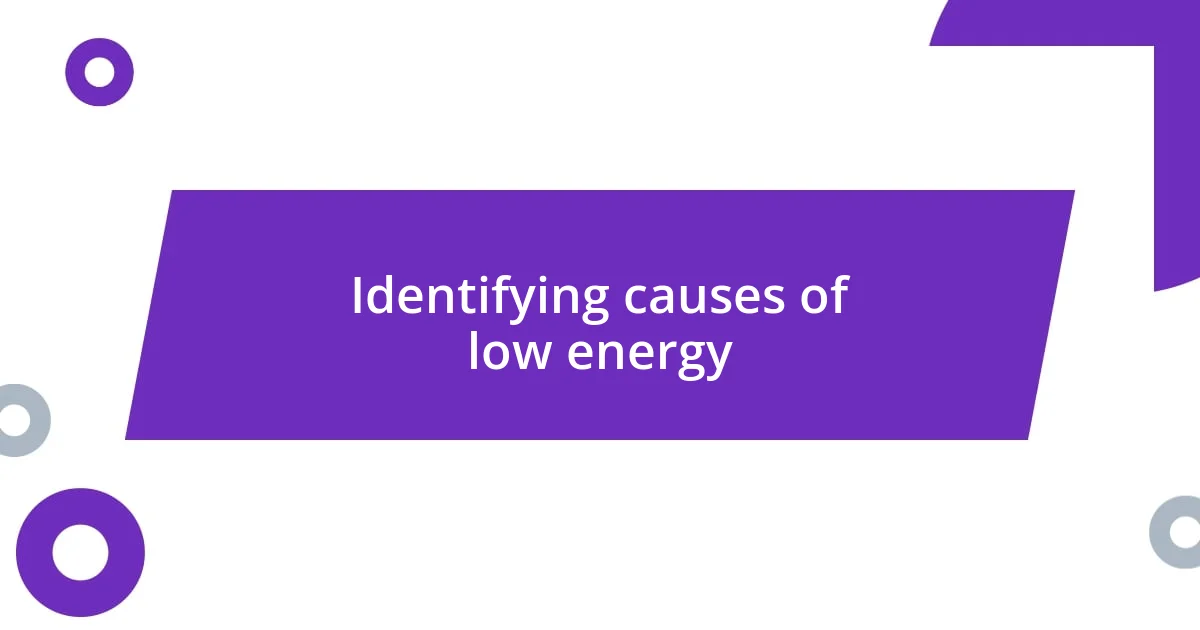
Identifying causes of low energy
Identifying low energy levels can be a bit like detective work. At one point, I thought my lack of energy was purely physical, until I realized that my mental state was just as significant. For example, I used to feel utterly drained after a long workweek filled with deadlines. Even after resting, I found myself dragging through the weekend, unable to shake that tired feeling because my mind was still racing with unresolved tasks and worries.
To better understand the causes of low energy, consider these factors:
- Diet: Foods high in sugar and refined carbs can lead to energy crashes.
- Sleep Quality: Not just the quantity, but the type of sleep we get matters. Interrupted or poor-quality sleep can leave you feeling unrested.
- Hydration: Dehydration can create fatigue, making a simple glass of water a vital energy booster.
- Stress Levels: Emotional stress can physically deplete you, affecting your motivation and stamina.
- Physical Activity: Ironically, too little exercise can paradoxically drain your energy rather than revive it.
Recognizing these elements has been essential for me. It’s incredible how a change in one area, like improving my hydration, can uplift my overall energy levels. Each aspect is interconnected, and understanding this puzzle is key to reclaiming our vitality.
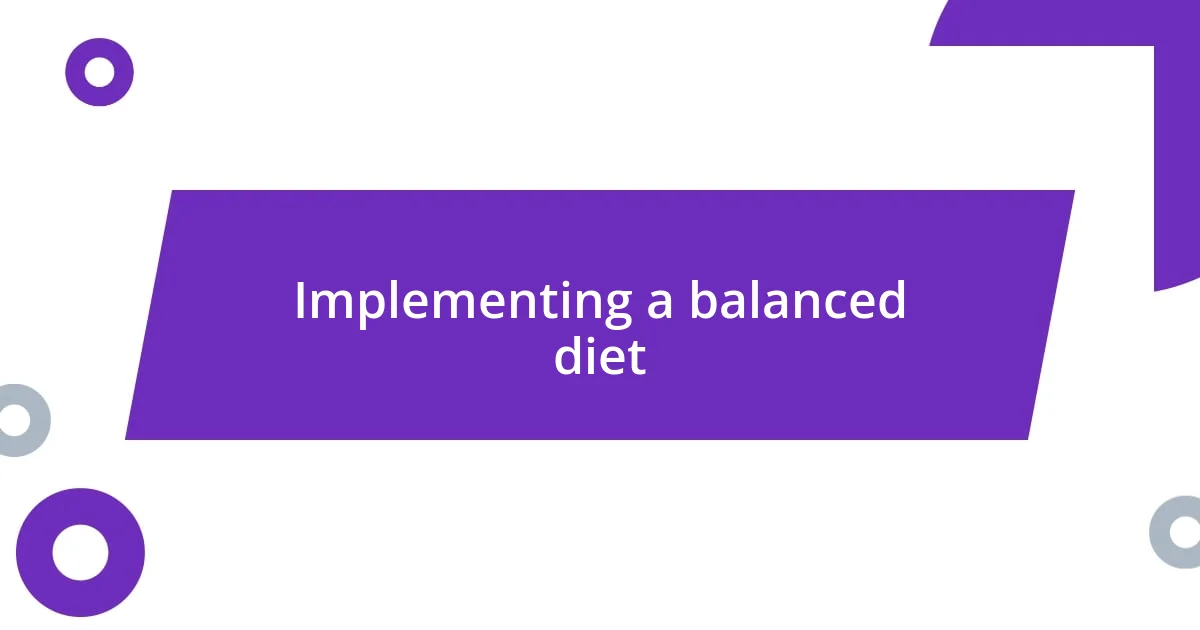
Implementing a balanced diet
Implementing a balanced diet has been pivotal in my journey to rejuvenate my energy levels. I still remember the moment I swapped my usual breakfast of sugary cereals for a hearty bowl of oatmeal topped with fresh berries and nuts. The difference was remarkable; I felt fuller and more energized throughout the morning. When I began to prioritize whole foods, I noticed that my energy didn’t plummet in the afternoon like it used to. It’s as if I finally tapped into a hidden reservoir of vitality.
Every meal became an opportunity to nourish myself deeply. I started experimenting with meal prepping to ensure I had wholesome options readily available. It was during one of these meal prep sessions that I realized the beauty of color on my plate. Incorporating a range of fruits, vegetables, lean proteins, and whole grains made each meal a feast for the eyes and body. Have you ever experienced the joy of preparing a vibrant salad, knowing you’re tackling not just hunger but also fueling your body with essential nutrients? That simple act made a profound difference for me; it became more than just eating— it evolved into a ritual of self-care.
Furthermore, I learned the importance of listening to my body’s needs. If I craved certain foods, I’d ask myself whether those cravings were for nourishment or simply comfort. For instance, when I felt tired, I shifted my focus from quick fixes like coffee to magnesium-rich foods like bananas or dark chocolate. This transition helped me regain not just my energy but also a sense of balance. Have you ever felt empowered by making such mindful choices? This approach not only lifted my energy but also transformed my relationship with food.
| Food Type | Impact on Energy Levels |
|---|---|
| High Sugar Foods | Causes energy crashes shortly after consumption |
| Whole Grains | Provide sustained energy due to slow digestion |
| Fruits & Vegetables | Rich in vitamins and antioxidants that promote vitality |
| Lean Proteins | Fuel muscle repair and keep you feeling full longer |
| Hydration | Makes a significant difference in overall energy levels |
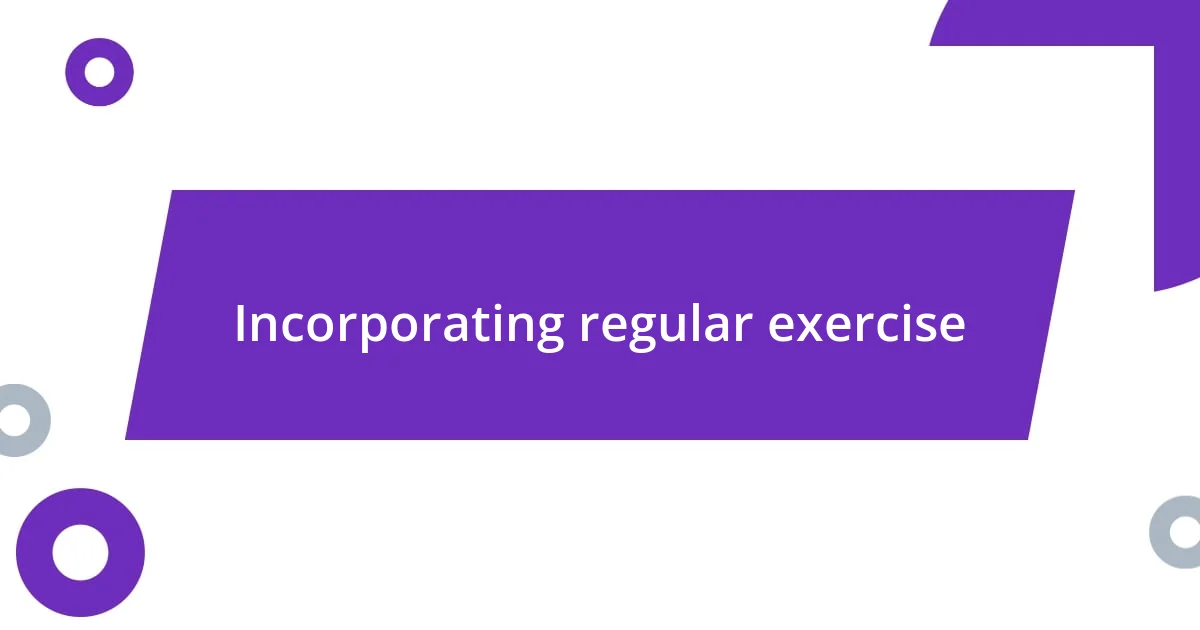
Incorporating regular exercise
Incorporating regular exercise was a game changer for me. I remember the initial struggle of fitting workouts into my busy schedule. There was a time when I believed that just a few minutes of movement wouldn’t make a difference. But then, I tried a short, 15-minute routine one morning, and it left me feeling surprisingly invigorated. Who would have thought that a quick burst of activity could lift my spirits and energy levels so dramatically?
As I made exercise a consistent part of my routine, the most significant change occurred in my mindset. I began to see workouts not as another task on my to-do list, but as an essential ritual for my well-being. Every time I finished a session, there was this palpable sense of accomplishment that radiated throughout my day. It felt as if I had unleashed a reservoir of energy I didn’t know existed. Have you ever experienced that exhilarating high after a good workout? It’s like the world suddenly seems a bit brighter.
I found that mixing up my activities kept things fresh and exciting. From dancing in my living room to yoga sessions on my balcony, variety made a world of difference. The joy of discovering new forms of movement invigorated my routine. It was during one of those dance sessions that I realized how liberating it felt to not just exercise, but truly enjoy the process. I encourage you to explore what engages you; who knows, you might find a new passion that breathes life into your day-to-day energy!
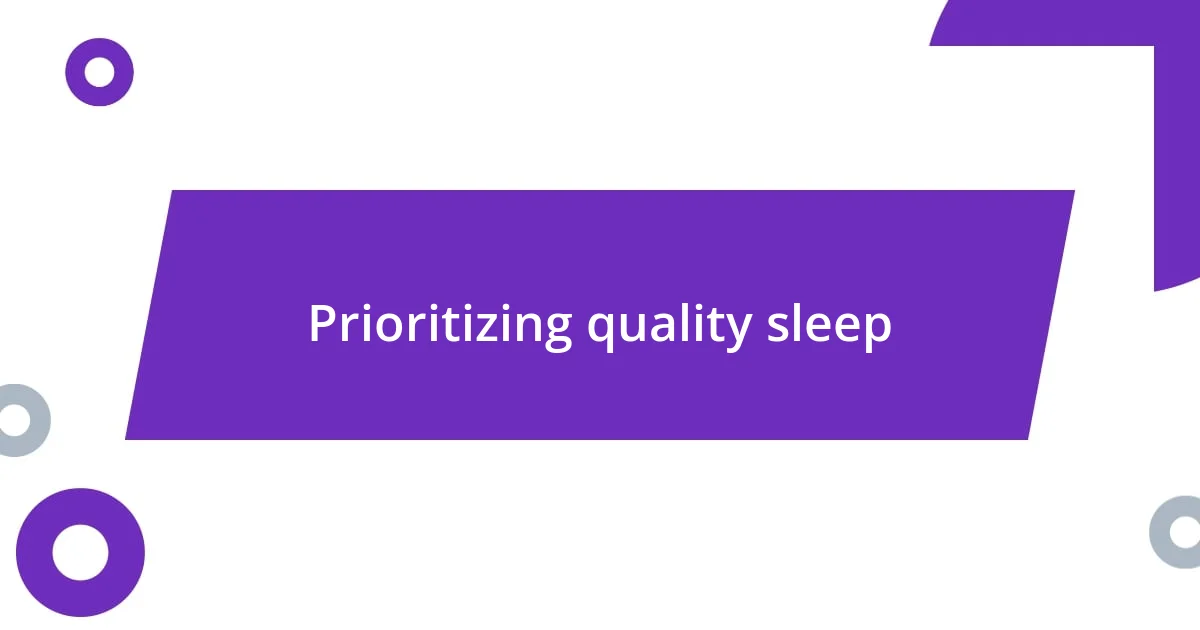
Prioritizing quality sleep
Prioritizing quality sleep
For me, quality sleep is the powerhouse of rejuvenation. There was a period when I brushed off the importance of sleep, thinking I could function on just a few hours. But after experiencing those heavy-lidded mornings and foggy afternoons, I realized how crucial it was to invest in my rest. I can’t help but wonder—have you ever felt the stark contrast between a night of good sleep and one filled with restless tossing?
Establishing a bedtime routine was a game changer. I began dimming the lights an hour before bed and putting away my screens. I even created a cozy reading nook that became my haven for winding down. As I turned the pages of a book instead of scrolling through my phone, I noticed how much calmer I felt. It makes me think—what small changes could you make to enhance your nighttime ritual, inviting more tranquility into your evenings?
I also learned to be mindful of my sleep environment. I invested in blackout curtains and a white noise machine, transforming my bedroom into a sanctuary. The difference was immediate; I started waking up refreshed instead of groggy. Have you ever given your sleep space a makeover? It’s incredible how the right setting can foster deeper rest and, in turn, elevate your energy levels. In those moments of peaceful slumber, I found a treasure trove of restoration that fueled my vitality each day.
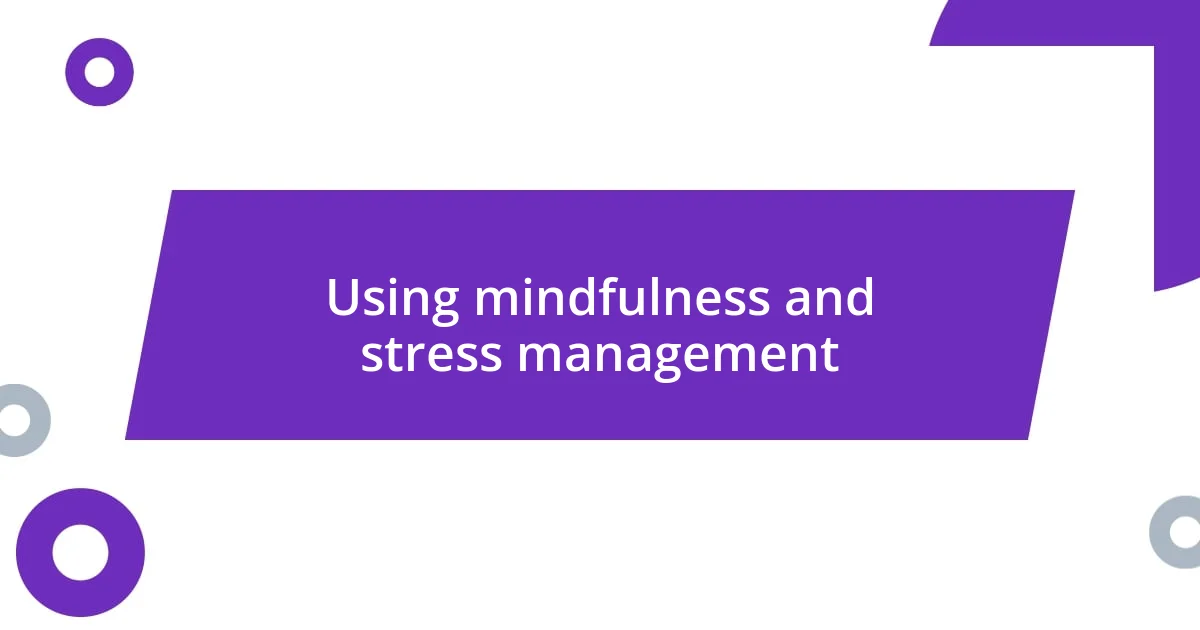
Using mindfulness and stress management

Using mindfulness and stress management
I remember the first time I intentionally practiced mindfulness. I simply sat in my favorite chair and focused on my breathing. As I inhaled and exhaled, I felt my busy thoughts start to dissolve. It’s quite fascinating how just five minutes of being present can shift my entire perspective. Have you ever noticed how quickly your mind races? Taking that deliberate pause helped me find a bubble of calm amidst the chaos, reigniting my energy levels in ways I never expected.
Integrating stress management techniques into my routine has been a pivotal aspect of my journey. I discovered the power of journaling, where I could empty my head of worries and reflect on my day. Trust me, there’s something cathartic about writing it all down. During one particularly overwhelming week, I took a few moments each evening to jot down my thoughts, and it felt like shedding a weight. It led me to ask myself—what bothers me the most, and how can I address it? This simple practice kept my stress at bay and opened up space for positive energy to flow in.
I also embraced guided meditation, which became a cherished part of my day. I recall one session where I felt a wave of peace wash over me as I followed the soothing voice guiding me through relaxation. The longer I practiced, the more attuned I became to my body’s signals. It often makes me think—are you in tune with how your body feels? This awareness has become crucial; I learned to spot when stress was creeping in and to nip it in the bud. Each mindful moment has transformed how I manage stress, creating a ripple effect that boosts my overall energy and well-being.
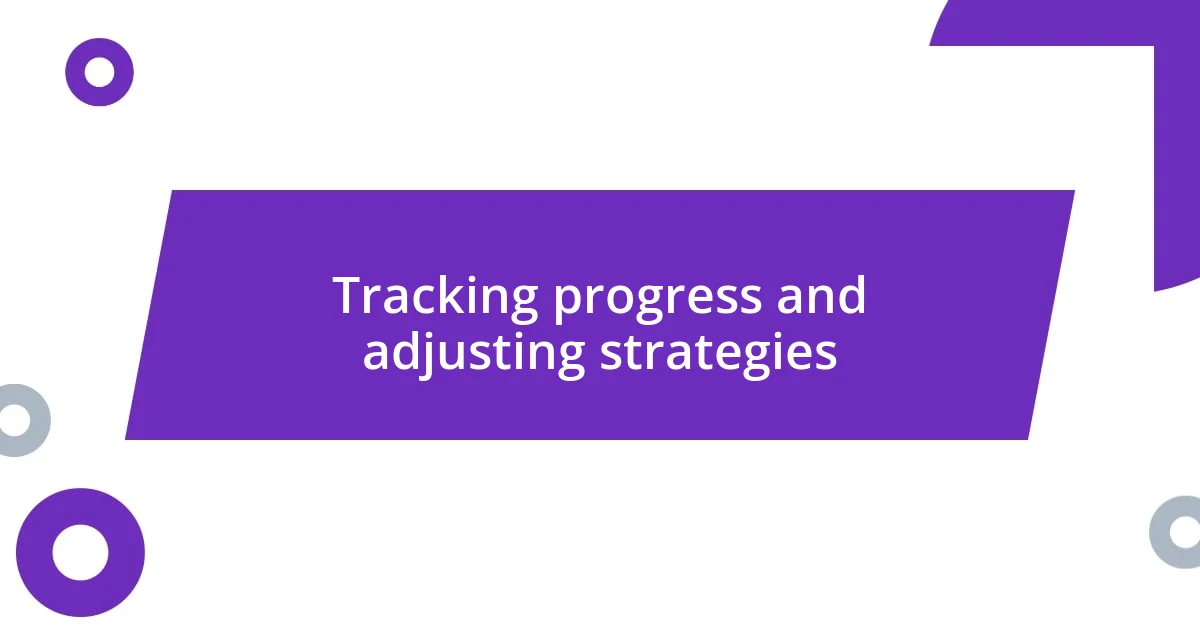
Tracking progress and adjusting strategies
Tracking my progress was essential in my journey to rejuvenate my energy levels. I started by journaling daily, making note of what strategies worked and how I felt afterward. There were days I felt energized after an early morning workout, while other times, a simple change in my diet made all the difference. Reflecting on these patterns allowed me to identify what truly lifted my spirits. Have you ever kept a journal to track your feelings? If so, you might have noticed those enlightening moments too.
Adjusting strategies based on my observations was equally important. For instance, when I realized that caffeine in the afternoon led to restless nights, I consciously shifted my coffee consumption to the morning. This small change reaped substantial rewards—I began sleeping much better and woke up feeling more rested. How often do we hold onto habits that no longer serve us? Recognizing when something isn’t working and having the courage to change it can be incredibly freeing.
Lastly, I discovered the power of flexibility in my approach. When I noticed my energy dips after long workdays, I started incorporating short walks during breaks. This simple adjustment rejuvenated my focus and revived my motivation. Have you considered how tiny tweaks in your daily routine could transform your energy levels? Being open to modifying my plans has helped me maintain a consistent path to revitalization, ensuring I stay energized and engaged throughout my day.












